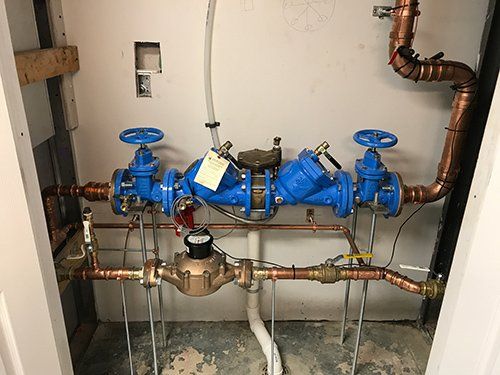Should I Backflow Test My Water
Should I Backflow Test My Water
Blog Article
Nearly everybody seems to have their personal theory involving Backflow Prevention.

Yes, you need to backflow test your home's water to guarantee that the water is free of contaminants and also dangerous degrees of chemicals. As a result of the devices needed and room for error, you need to not try to carry out backflow testing on your own. We recommend that you call an expert plumber every number of years to evaluate your water.
Heartburn Can Impact Both You and Your City
Due to the fact that dangerous backflow can impact the public water supply in enhancement to a single building, lots of cities develop heartburn standards. The good news is, contemporary cities have backflow tools in place that safeguard the water that comes from many residences and commercial properties. The real hazard originates from irrigation systems, which can damage the supply of water with toxic plant foods, manure, and various other chemicals.
What Creates Backflow?
A regular cause of backflow is a loss of water stress that triggers the water to siphon back right into the water supply. After some time, there is a loss in water pressure as well as the tube begins to draw the water back into the water supply. As you can imagine, there are currently chemicals from the paint that are entering the water supply, potentially posturing a risk.
Heartburn Screening is Called For by Legislation in Particular Cities
Depending on where you live, you may really be required by regulation to backflow examination your law. Iowa City keeps a record of all homes served by the city's water supply.
You Can Protect Against Backflow
Hazardous backflow is conveniently preventable if you have an expert plumber mount a backflow gadget. If there is an active threat, the plumber will also evaluate for backflow as well as figure out. The primary function of a heartburn device is to prevent water from flowing in reverse right into your water. Plumbers mount the tool on the pipes in your residence to make sure that the water only flows in the proper instructions.
What is Backflow?
In other words, heartburn is when water moves upwards-- the opposite instructions in the plumbing system. This is additionally known as "backpressure." When the water moves in this instructions, it can mix with hazardous toxic substances as well as present a threat.
Call a Plumber to Evaluate for Backflow Prior To It is Far too late
A plumbing firm can quickly evaluate your house's water to identify if there are any type of hazardous chemical levels. And if you do find that your water has high levels of toxins, a plumber can conveniently set up a backflow avoidance tool.
Yes, you require to backflow examination your residence's water supply to make certain that the water is free of toxins as well as damaging levels of chemicals. Numerous cities develop heartburn guidelines since dangerous heartburn can influence the public water supply in enhancement to a solitary structure. A common cause of heartburn is a loss of water stress that creates the water to siphon back right into the water supply. After some time, there is a loss in water pressure and also the pipe starts to draw the water back right into the water supply. The major purpose of a backflow device is to protect against water from flowing backwards into your water supply.
Backflow Testing: What Is It, and Why Is It Necessary?
What Is Backflow?
Backflow is exactly what you might imagine this somewhat gross-sounding word to mean. It is contaminated water that has reversed flow, and as a result, enters into the clean water lines of homes and businesses. Backflow is typically caused by a significant change in water pressure. This can be due to a water main break, frozen pipes or an unexpectedly high demand on the water system. It can occur at any cross-connection between clean and dirty water in residential, commercial or industrial water lines. And the worst part – backflow can contain hazardous materials like human waste, pesticides or chemicals. Needless to say, it poses very, very serious health concerns, not to mention the potential for a heap-load of expensive stress!
Backflow Prevention and Testing
In order to safeguard against backflow in standing structures, a backflow prevention device should be installed by a trusted team of professionals. Once installed, if there should ever be an unexpected or dramatic change in water pressure, the device will prevent backflow from entering into the clean water supply system. But, again, it’s important that this device is properly installed by a professional so that they can test it and ensure that the clean water line remains contaminant free. This really is key.
While personal standards and responsibilities should maintain certain routine testing requirements, there are already municipal codes in place that require annual testing of these backflow prevention devices. This ensures that they are functioning properly and that no hazardous contaminants are spilling out into the clean water supply. If, however, testing of any device is not completed on time, you should know that a property or business’ water supply might be interrupted, and the property owner might even face fines. So, to avoid this from happening to you, we recommend scheduling a backflow test well in advance.
Fortunately, here at Tritan, we can help schedule and carry out backflow testing for your property. We provide a variety of backflow-related services, including prevention device installation and testing. Call us today and make sure that this stressful problem doesn’t happen to you and your property or business.
https://www.tritan-plumbing.com/blog/2018/february/backflow-testing-what-is-it-and-why-is-it-necess/

I came across that blog post about Backflow Assembly Testing when looking around the internet. So long as you enjoyed reading our blog post please be sure to share it. I am grateful for your time. Please visit our blog back soon.
Plumbing SOS? Dial! Report this page